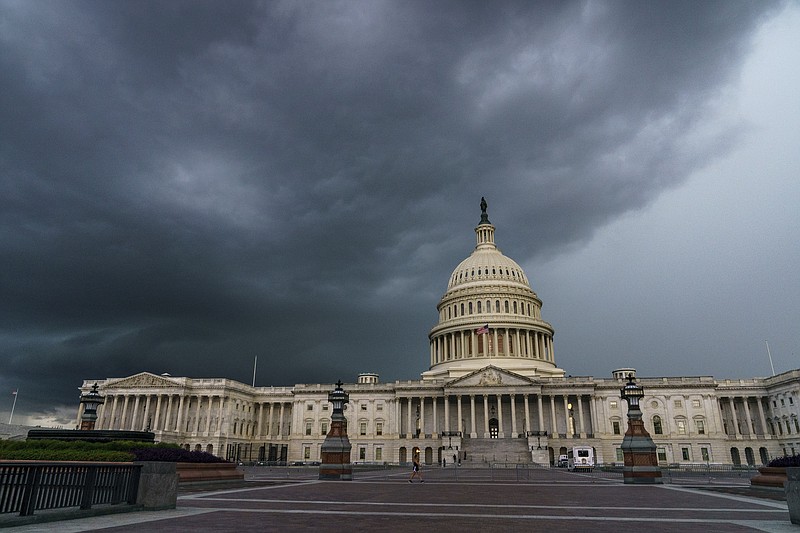WASHINGTON -- The tensions coursing through the United States over racism and policing are likely targets for adversaries seeking to influence the November election, lawmakers and experts warn -- and there are signs that Russia is again seeking to exploit the divide.
Earlier this year, Facebook, Instagram and Twitter pulled down dozens of accounts with names like "Blacks Facts Untold" that had been followed or liked by hundreds of thousands of people. The accounts were fake, created by an organization in Africa with links to Russia's Internet Research Agency.
Similarly, this past week Facebook announced that it had removed a network of accounts linked to that "troll factory" that had pushed out stories about race and other issues. The network had tricked unwitting American writers to post content to the pages.
It's a troubling but familiar pattern from Russia, as the Internet Research Agency overwhelmingly focused on race and the Black Lives Matter Movement when targeting the U.S. in 2016. The goal, part of the Russian playbook for decades, was to sow chaos by posting content on both sides of the racial divide. Indeed, "no single group of Americans was targeted by IRA information operatives more than African-Americans," concluded a report from the Senate Intelligence Committee.
Democrats were furious last weekend after Director of National Intelligence John Ratcliffe informed Congress that the office would supply written information to the intelligence committees about election threats but would no longer be doing in-person briefings, denying lawmakers the chance to ask questions.
[RELATED » Full coverage of elections in Arkansas » arkansasonline.com/elections/]
The cancellation came a few weeks after U.S. intelligence officials publicly stated that Russia is using a variety of measures to denigrate President Donald Trump's opponent, Democratic candidate Joe Biden, ahead of the election.
The intelligence statement did not offer specifics about what tactics Russia is using, but the past provides important clues.
In 2016 the Internet Research Agency had an "overwhelming operational emphasis on race" that was apparent in the online ads it purchased -- more than two-thirds contained a term related to race. The company targeted that content to "African-Americans in key metropolitan areas with well-established black communities and flashpoints in the Black Lives Matter movement," according to a Senate Intelligence Committee report. One of its top performing pages, "Blactivist," generated 11.2 million engagements with Facebook users.
Bret Schafer, an expert on foreign disinformation with the bipartisan group Alliance for Securing Democracy, said stoking racial animosity is a Kremlin strategy that goes back decades. His group tracked a major uptick in social media activity on racial issues from Russian state-sponsored media and political figures this summer, especially after the killing of George Floyd at the hands of Minneapolis police.
"We have seen a constant messaging theme being race and racism in the U.S.," Schafer said. "They're very good at it."
The acting chairman of the Senate committee, Sen. Marco Rubio, R-Fla., told a local news outlet this past week that he has spoken to Ratcliffe and expects the in-person briefings to continue. But it is unclear whether they will. A spokeswoman for Ratcliffe would not confirm Rubio's remarks.
The committee's top Democrat, Virginia Sen. Mark Warner, says he has been working with Rubio to urge Ratcliffe to reverse the decision.
"Ninety percent of the information I've ever gained from any briefing is not from the briefing, it's from the questions," Warner said.
The intelligence committees are receiving some information from the social media companies themselves, notably Facebook and Twitter. The companies were slow to respond in 2016, but are now waging sophisticated efforts to root out foreign interference. Twitter stopped accepting political ads, while Facebook began verifying the identity of ad buyers in 2018 and last week said it will restrict new political ads in the 7 days before the election.
Nina Jankowicz, disinformation fellow at the nonpartisan Wilson Center, says there has been an improvement in tracking, but because the issue of interference has been so politicized, Congress and the public aren't getting enough information.
"What people need to be looking for is stuff that is seemingly trying to get a rise out of them," Jankowicz said. "Don't think you are going to find a troll. It's about guarding yourself from emotional manipulation."
Information for this article was contributed by David Klepper, Amanda Seitz, Barbara Ortutay and Deb Riechmann of The Associated Press.
